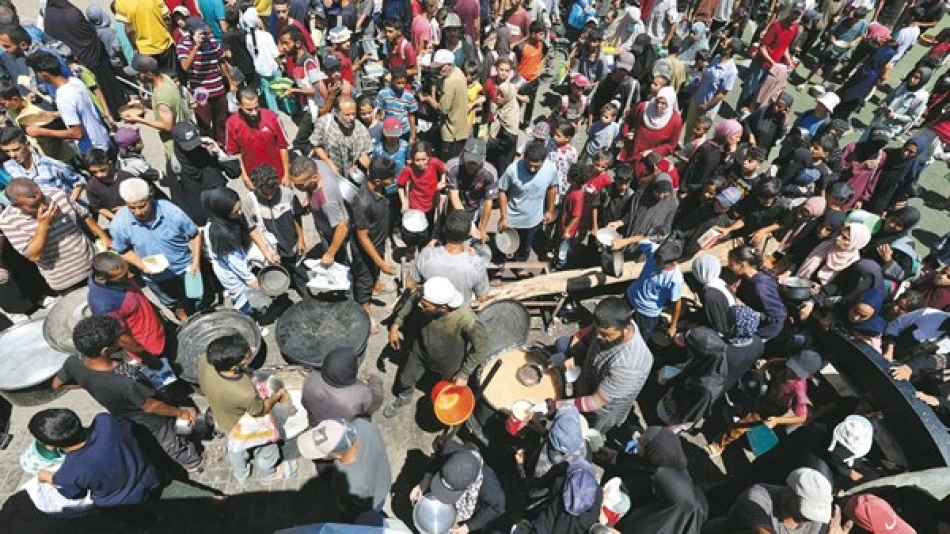
Gaza on the Brink of Devastating Famine as Crisis Deepens
Gaza Faces "Mass Death" as Israel's Border Blockade Enters Fifth Month
Gaza's government media office has declared the Palestinian territory is on the brink of "mass death" after more than 140 days of complete border closures that have created what officials describe as an unprecedented humanitarian catastrophe. With 86 Palestinians already dead from malnutrition—including 76 children—the crisis represents a stark escalation in the use of starvation as a weapon of war, according to Palestinian authorities and UN agencies.
The Numbers Behind the Crisis
The Gaza Health Ministry reports that hospitals are overwhelmed with Palestinians of all ages arriving in states of severe exhaustion and malnutrition. Among Gaza's 2.4 million residents, 1.1 million are children, with 17,000 now suffering from acute malnutrition. The territory recorded 18 famine-related deaths in a single 24-hour period, highlighting the accelerating pace of the crisis.
Four-year-old Razan Abu Zaher became the latest casualty, dying from complications related to malnutrition at Al-Aqsa Martyrs Hospital in Deir al-Balah. Medical sources indicate that hospitals lack sufficient beds and medications to treat the massive influx of patients suffering from acute hunger, with some experiencing memory loss due to severe malnutrition.
Complete Isolation Strategy
Since March 2, 2025, Israel has maintained a total closure of all border crossings with Gaza, preventing the entry of food and medical aid. This represents a significant escalation from previous blockade policies that typically allowed limited humanitarian supplies through designated checkpoints.
The closure has eliminated Palestinians' ability to secure basic survival necessities. Most residents have lost access to flour needed for bread production, while small quantities available on the black market have become prohibitively expensive for a population already pushed to the brink.
International Response and Legal Implications
The United Nations Relief and Works Agency for Palestine Refugees (UNRWA) has directly accused Israeli authorities of deliberately starving Gaza's one million children. This represents unusually strong language from the UN agency, which typically employs more diplomatic terminology when addressing Israeli policies.
The Palestinian Foreign Ministry has intensified its diplomatic efforts, working through international legal channels to expose what it characterizes as the weaponization of starvation against civilians. The ministry is pushing for binding international measures to force Israel to reopen crossings and allow humanitarian aid.
Historical Context and Precedent
While Gaza has experienced multiple blockades and military operations since 2007, the current crisis represents an unprecedented complete closure lasting over four months. Previous escalations typically saw some humanitarian corridors maintained, even during the most intense periods of conflict.
The use of starvation as a method of warfare has drawn comparisons to historical sieges, though the scale and systematic nature of the current blockade affecting 2.4 million people represents one of the largest civilian populations subjected to such conditions in the modern era.
Medical Infrastructure Collapse
Gaza's healthcare system, already weakened by years of conflict and blockade, is now facing what medical sources describe as an impossible situation. Hospitals report treating hundreds of patients for acute hunger and malnutrition-related conditions, but lack the resources to provide adequate care.
The crisis has created a cascading effect where malnutrition weakens immune systems, making the population more susceptible to disease outbreaks that could further overwhelm medical facilities. Medical staff report cases of severe psychological trauma, including memory loss directly attributed to prolonged hunger.
International Legal and Political Ramifications
The systematic nature of the blockade and its impact on civilian populations raises significant questions under international humanitarian law. The deliberate prevention of food and medical supplies to civilian populations constitutes a potential violation of the Geneva Conventions' provisions regarding the protection of civilians during armed conflict.
Palestinian officials have framed their diplomatic campaign around these legal principles, seeking to build international pressure for immediate intervention. However, the effectiveness of such efforts will largely depend on major powers' willingness to translate condemnation into concrete action.
The crisis in Gaza represents a critical test of international humanitarian mechanisms and the global community's commitment to protecting civilian populations from the weaponization of basic human needs. With deaths mounting daily and conditions deteriorating rapidly, the window for preventing a larger catastrophe continues to narrow.
Most Viewed News

 Layla Al Mansoori
Layla Al Mansoori






